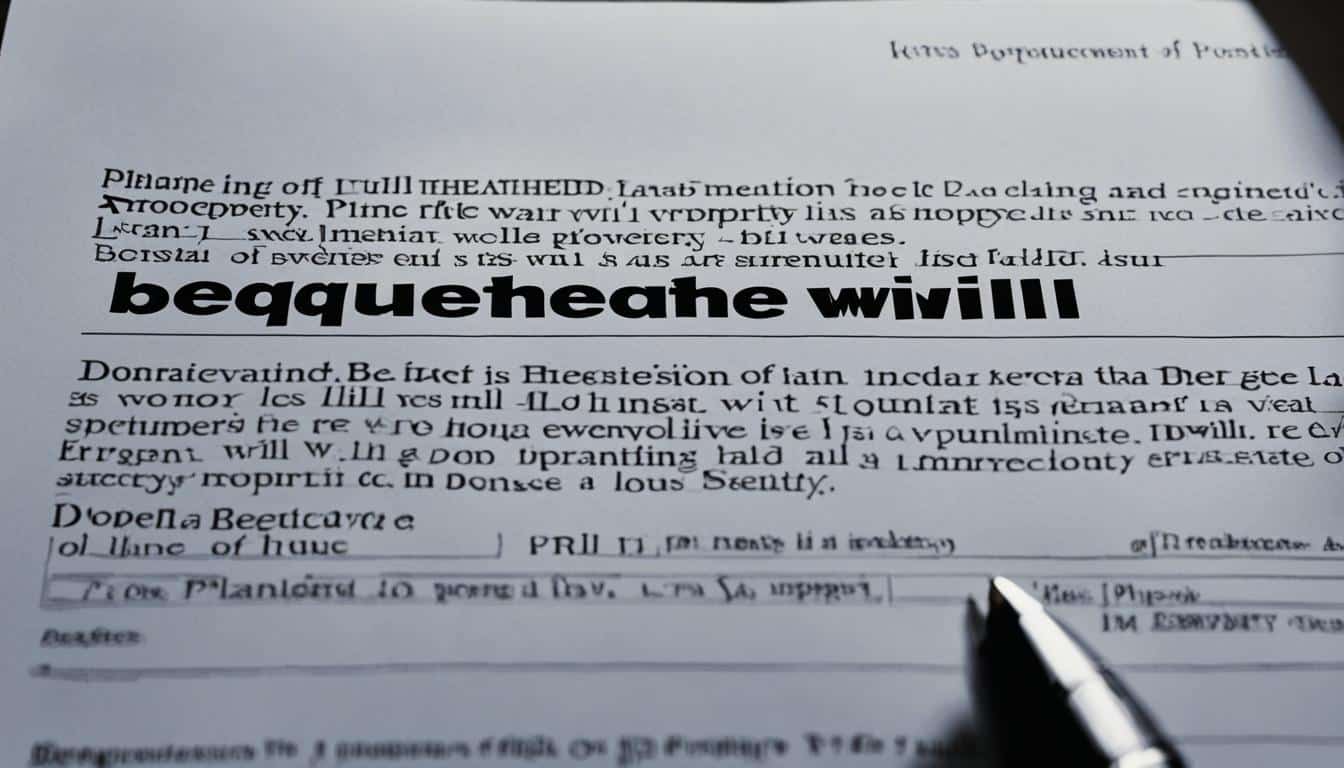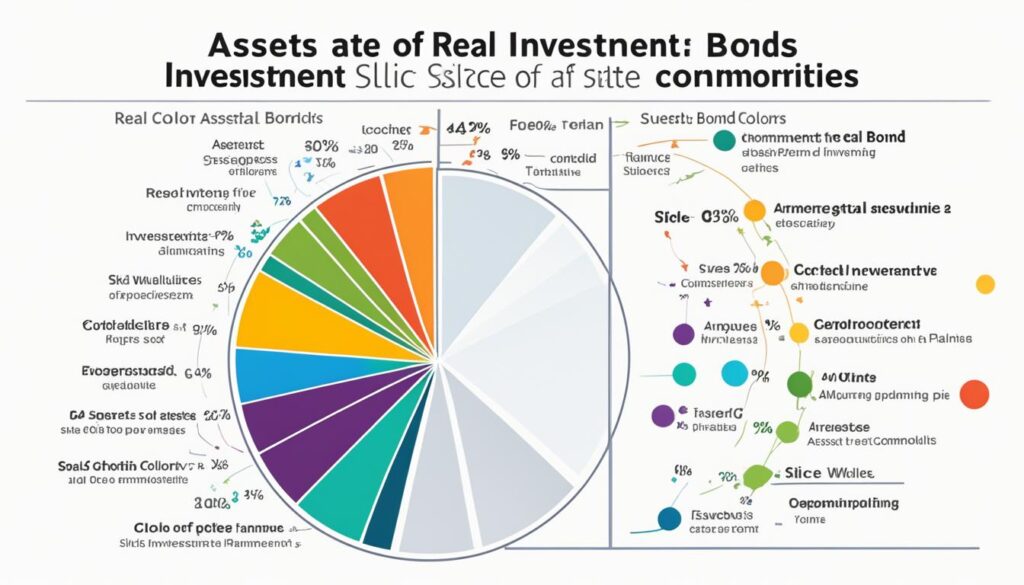
In the realm of estate planning, a bequeathed will is an indispensable tool for securing the distribution of assets according to one’s wishes after their passing. A bequeathed will, or last will and testament, details the testamentary gifts designated for specific individuals or organizations, ensuring the deceased’s legacy aligns with their values and desires.
By creating a bequeathed will, individuals can navigate the complexities of estate administration and minimize legal challenges, while also providing tax benefits for the beneficiaries. As a result, crafting a tailored will is not only a strategic move but one that offers peace of mind to those leaving a legacy behind.
Understanding the Fundamentals of Bequeathed Wills
Bequeathed wills are a crucial aspect of estate planning that allows individuals to express their wishes regarding the distribution of their assets after their passing. By understanding the concept of bequests, their role in estate planning, and the different types of bequests, individuals can ensure that their inheritance is received as intended and create a lasting legacy.
The Definition and Importance of Bequests
A bequest is a testamentary gift specified in an individual’s last will and testament, which reflects their wishes for the allocation of assets after their death. Bequests allow individuals to have control over the future distribution of their property, ensuring that their values and desires are considered. They play a vital role in estate planning, enabling people to manage their inheritance and provide financial support to their loved ones, as well as suitable charitable organizations.
How Bequests Operate in Estate Planning
In estate planning, bequests are expressed through legal documentation, such as wills and trusts, which dictate how an estate should be administered posthumously. Once the individual passes away, the executor of the will or trustee of the trust is responsible for administering the estate and ensuring that the testamentary gifts are allocated according to the deceased’s wishes. Bequests in estate planning streamline the inheritance process, minimize potential legal complications, and provide peace of mind to both the benefactor and beneficiaries.
The Different Types of Bequests and Their Purposes
There are several types of bequests that can be included in a bequeathed will, each serving a unique purpose, including:
- General Bequests: Gifts taken from the estate’s general assets, without reference to specific items or accounts.
- Specific Bequests: Gifts of particular items or properties, such as jewelry, real estate, or specified amounts of cash.
- Demonstrative Bequests: Testamentary gifts sourced from a specific account or fund, like a certain bank account or investment portfolio.
- Residuary Bequests: The remaining gifts after debts, taxes, and other bequests have been settled, which can include the remaining balance of an estate or a percentage of the remaining assets.
By understanding the various types of bequests and incorporating them appropriately, individuals can create a bequeathed will that accurately represents their wishes and ensures that their assets are distributed as intended.
The Legal Process of Bequeathing: Probate and Validation

The legal aspects of bequeathing assets in a will are essential to ensure the proper distribution of the testator’s estate. One critical aspect is the probate process, during which a will is legally validated and the distribution of assets takes place according to the bequeathed will’s instructions. It’s especially crucial to prepare a well-crafted will to avoid unwanted outcomes, like asset distribution according to state law when someone dies intestate.
The probate process is a legal proceeding that validates a will and ensures the testator’s assets are properly distributed among the beneficiaries. This process involves a court overseeing the administration of the estate, paying any debts or taxes, and distributing the remaining assets according to the instructions in the bequeathed will. By understanding and navigating the probate process effectively, individuals can guarantee that assets are allocated as intended, minimizing conflicts and potential legal challenges.
Implications of Dying Intestate: State Law and Asset Distribution
When an individual dies intestate, meaning without a will, the estate is distributed according to state law rather than the deceased person’s wishes. This can result in undesired outcomes since the division of assets may not align with what the decedent would have wanted. The intestacy laws vary among states, causing confusion and potential disputes among surviving family members. To avoid these issues, a well-crafted bequeathed will is crucial, ensuring the proper and intended distribution of the testator’s estate.
Comprehensive Estate Planning with Bequeathed Wills

As a crucial component of estate planning, bequeathed wills are just one part of a comprehensive estate strategy which aims to preserve and distribute assets according to an individual’s wishes. Developing a thorough understanding of personal assets and intentions for their future allocation is essential to create a well-rounded plan that caters to all potential circumstances. Such planning not only incorporates the drafting of bequeathed wills but also takes into consideration situations such as incapacity and the need for clearly named beneficiaries in legal documentation.
The role of a will executor is invaluable to the estate planning process. Responsible for upholding the testator’s desires as expressed in the will, an executor ensures assets are managed and distributed in accordance with the legal documentation. The responsibilities of an executor may include overseeing the distribution of specific and general bequests, as well as addressing instances in which beneficiaries choose to refuse their inheritance through disclaimers.
When constructing comprehensive estate strategies, it is vital to have professional guidance from experts in the field. This can help ensure the legal documentation is clear and accurate and that all state requirements are met for a valid bequeathed will. By working with experienced professionals, individuals can minimize potential complications and maximize peace of mind that their estate will be distributed and managed according to their intentions.
Specific vs. General Bequests: Tailoring Your Legacy

When drafting bequeathed wills, individuals have the option to incorporate specific and general bequests. The choice between these types of bequests can greatly influence the overall outcome of the property distribution and the nature of the legacies left behind. Specific bequests cater to individual items or amounts directed to certain beneficiaries, while general bequests come from the general assets of the estate and are not item-specific. By thoughtfully understanding and strategically planning the types of property in bequests, individuals can tailor their legacies to align with their personal wishes, ensuring the inheritance is both meaningful and satisfying for their loved ones.
Understanding the Specific Types of Property in Bequests
Specific bequests involve the allocation of particular items or amounts to designated beneficiaries. For example, an individual might choose to leave a cherished family heirloom, such as fine jewelry or a cherished artwork, to a specific family member. Likewise, specific bequests can also include financial assets like cash gifts in predetermined amounts. These bequests provide the opportunity to create personalized, tailored legacies that reflect the unique preferences and circumstances of both the deceased and their beneficiaries.
Designing Bequests for Tailored Legacies
General bequests, on the other hand, involve the non-specific distribution of assets to chosen beneficiaries. Unlike specific bequests, general bequests do not designate particular items or amounts, instead drawing from the overall estate. Examples of general bequests include monetary bequests in unspecified amounts or disbursements of undesignated property. Being thoughtfully aware of the differences between specific and general bequests, and crafting bequeathed wills with a combination of both, enables individuals to create their own unique, tailored legacies that truly resonate with their personal values and desires and provide a fitting inheritance for their beneficiaries.
Demonstrative vs. Residuary Bequests: Strategic Asset Allocation

The types of bequests one makes in a bequeathed will can significantly impact the distribution and administration of their estate posthumously. Demonstrative bequests and residuary bequests offer distinct possibilities for strategic asset allocation, giving individuals granular control over their assets and how they are allocated after they pass away.
Demonstrative bequests are gifts that come from a particular source, such as a designated bank account. This type of bequest provides clear instructions on where the asset should originate, simplifying the estate administration process. For example, an individual may decide to leave a gift to their favorite charity from a specific savings account, ensuring that the funds are directed precisely as per their wishes.
On the other hand, residuary bequests refer to the remainder of an estate after all debts, expenses, and other bequests have been settled. This form of bequest allocates the residual assets to one or more beneficiaries, providing a practical solution for any unallocated or disputed property. A residuary bequest ensures that all assets are accounted for and distributed as per the testator’s wishes, without leaving any loose ends.
Considering both demonstrative and residuary bequests enables individuals to devise tailored strategies for their estate’s distribution. Through careful planning and a well-crafted bequeathed will, individuals can maintain a solid control over how their assets are managed and allocated posthumously, ultimately ensuring a seamless estate administration process and a lasting legacy that is in line with their values and desires.
Bequeathed Wills: Crafting a Testamentary Gift That Reflects Your Wishes

Crafting a bequeathed will is a deliberate process in which individuals articulate the testamentary gifts they wish to leave behind. This directs not only the distribution of tangible assets but also represents the individual’s values and thoughtful considerations for the beneficiaries’ welfare.
Clear legal documentation is pivotal to ensuring that these testamentary gifts reflect the wishes of the testator and are honored accordingly after their passing. Meticulous estate planning and the careful selection of bequests allow for a testamentary gift that aligns with the testator’s inheritance wishes.
From specific and general bequests to demonstrative and residuary bequests, each type plays a role in shaping the legacy left behind. As estate administration unfolds, the bequeathed wills serve as the ultimate guide for the executor to ensure the accurate distribution of assets.
Seeking guidance from professionals, such as estate planners or attorneys, can help navigate the legal complexities of crafting bequeathed wills, and ensure proper execution in line with the individual’s desires.
Charitable Bequests: Combining Philanthropy with Estate Planning

Charitable bequests offer a unique opportunity to integrate personal philanthropic goals with estate planning. By including charitable giving in bequeathed wills, individuals can leave a lasting impact, supporting various organizations and causes that align with their values, even after passing away. Inherent tax benefits and the efficacy of implementation make charitable bequests an attractive choice for those looking to combine estate planning with philanthropy.
The Impact and Efficiency of Charitable Giving through Wills
Incorporating charitable giving into bequeathed wills allows for efficient and impactful contributions to organizations such as the CDC Foundation. By specifying charitable bequests in wills, clarity is provided to the appointed executor, ensuring proper administration and distribution of the desired gifts. This streamlined approach ensures the testator’s philanthropic intentions are honored effectively, having a meaningful and lasting impact on the causes they cared for during their lifetime.
Tax Considerations and Benefits of Charitable Bequests
Charitable bequests offer several tax benefits, potentially reducing the taxable estate and offering opportunities for strategic asset allocation. Through careful planning, these bequests can be fashioned to maximize benefits for both heirs and the organizations earmarked for donations, providing tax savings on estate taxes and potentially leaving tax-advantaged assets to heirs. By incorporating charitable giving into estate planning, individuals can share their values and beliefs with future generations while reaping the financial benefits associated with these bequests.
The Role of Will Executors in Estate Administration

Will executors are vital to carrying out the intentions laid out in bequeathed wills, as they are responsible for managing aspects such as settling debts, paying taxes, and distributing assets to beneficiaries. Choosing a trustworthy executor helps ensure that the deceased’s wishes and legacy are respected during the estate administration process.
Duties and Responsibilities of Executors
Executor duties cover a wide range of tasks necessary to properly administer an estate in accordance with a bequeathed will. Some of these responsibilities include locating and protecting the assets, notifying creditors and other interested parties, settling outstanding debts, and ensuring the accurate distribution of assets to the named beneficiaries. Executors also play a key role in handling tax-related matters, such as filing final income tax returns and estate tax documents.
Selecting a Trustworthy Executor for Bequeathed Wills
It is crucial to appoint a reliable and trustworthy executor who understands and respects the testator’s wishes. A capable executor can either be a close friend, family member, or a professional, depending on the testator’s preferences. When selecting an executor, consider factors such as the person’s financial acumen, organization skills, and familiarity with the testator’s values and philanthropic goals. This ensures that the estate administration process is managed with integrity, ultimately honoring the deceased’s intentions as outlined in their bequeathed will.
Legal Documentation: Safeguarding Your Bequeathed Wills
The protection and execution of your testamentary wishes hinge on the diligent creation, updating, and storage of vital legal documents. Ensuring the proper management of these essential records is critical for carrying out the instructions outlined in bequeathed wills accurately. Navigating the intricacies of establishing and maintaining will documents can be challenging; however, resorting to professional guidance can streamline the process and alleviate potential pitfalls.
Creating, Updating, and Storing Essential Documents
Creating wills is the first crucial step in preserving and implementing your testamentary intentions. A comprehensive and well-structured will can help avoid potential conflicts and ensure a smooth distribution process. In addition to the initial creation, regular updates to will documents are necessary to accommodate changes in your life, such as new additions to the family or alterations in your financial situation. Secure storage of these important records, either in a safe deposit box or with a trusted attorney, ensures they remain intact and accessible when needed.
Seeking legal guidance from experienced professionals, such as estate planning attorneys, is instrumental in successfully managing the complexities of bequeathed wills. Expert advice can help clarify the nuances of estate laws, ensure that your will complies with legal standards, and optimize the process for your beneficiaries. Additionally, professional guidance can assist in selecting the most suitable options for your estate, such as trusts and powers of attorney, to supplement and fortify your bequeathed will.
Maximizing Tax Benefits through Strategic Bequests
Strategic bequests are essential for maximizing tax benefits related to the passing of one’s estate to beneficiaries. By considering which assets to include in bequeathed wills and determining appropriate methods of transferring them, individuals can minimize estate and inheritance tax liabilities and ensure that recipients derive maximum advantage from their inheritances.
When creating a bequeathed will, attention must be paid to potential consequences of estate tax savings. For instance, the allocation of tax-advantaged assets such as stocks can help heirs avoid excessive capital gains tax. This thoughtful planning takes into account various tax implications, which in turn promotes the financial efficiency of bequests and maximizes the benefits to beneficiaries.
Professional guidance can greatly help in navigating the complex landscape of taxes related to bequests. Estate planning attorneys, financial planners, and tax experts can provide valuable insights on customizing strategic bequests to align with tax laws and the individual’s wishes. With their assistance, you can create bequeathed wills that minimize the tax burdens on beneficiaries while ensuring that their inheritances reflect your precise intentions.
FAQ
What are bequeathed wills and why are they important?
Bequeathed wills are legal documents that outline an individual’s wishes for the distribution of their assets upon their death. They ensure the person’s wishes are honored and enable efficient estate administration, potentially minimizing legal complexities and maximizing tax benefits for beneficiaries.
What are the different types of bequests in estate planning?
There are four main types of bequests: general, specific, demonstrative, and residuary. General bequests involve gifts taken from the estate’s general assets; specific bequests concern particular items or amounts; demonstrative bequests come from a specific source like a bank account; and residuary bequests involve the remaining gifts after other bequests and debts are settled.
What is the probate process?
The probate process is the legal procedure in which a will is validated by a court to ensure its authenticity. During this process, the distribution of assets is carried out according to the instructions in the bequeathed will, and the executor is responsible for carrying out the testator’s wishes.
What is the difference between specific and general bequests?
Specific bequests pertain to individual items or amounts directed to certain beneficiaries, allowing for personalized legacies. General bequests are not item-specific and are taken from the general assets of the estate, allowing for broader distribution of the testator’s wealth.
How do charitable bequests impact estate planning and taxes?
Charitable bequests combine personal philanthropic goals with estate planning by allocating gifts to organizations posthumously. They offer tax considerations and benefits, as they may provide estate tax savings by reducing the taxable estate and strategically leaving tax-advantaged assets to heirs.
What is the role of a will executor?
The will executor is responsible for administering an estate according to the legal documentation and upholding the testator’s wishes. This includes paying debts and taxes, as well as distributing assets in accordance with the bequeathed will.
How can I maximize tax benefits through strategic bequests?
By carefully selecting assets to include in a bequeathed will and their form of transfer, individuals can minimize potential estate and inheritance taxes and reduce tax burdens that might arise from capital gains on inherited property. This results in more efficient inheritances for beneficiaries and maximizes their financial advantage.






